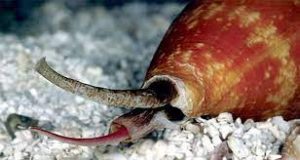Agencies-Gaza post
Deadly poison from an amazing marine creature relieves pain
Cone snails are amazing animals with beautifully decorated shells, but they are also some of the most dangerous creatures that live in the oceans.

Scientists from the University of Glasgow have revealed plans to use its toxins to create new painkillers that are more effective and less addictive than current options.
“The cone snail may appear to be an unlikely candidate for drug discovery breakthroughs, but the toxins it produces have a lot of interesting properties that have already shown promise in medicine,” said Dr. Andrew Jamieson, who is leading the project.
Cone snails are predatory marine animals found in warm seas and oceans all over the world.
It alleviates the stings by stretching a long, flexible tube known as a hose before releasing toxic teeth on her victim.

Its poison contains chemicals known as poisons, which are highly neurotoxic peptides that cause paralysis by blocking parts of the nervous system.
While this can be fatal for anyone who gets in the way of the cone snail, researchers believe that modified versions of peptides can be used to safely block pain receptors in humans.
The Glasgow University team is working with machine learning and artificial intelligence experts from the University of Southampton to investigate how snail cone venom affects human muscles.
To begin, the team will look into how peptides of toxins are formed at the molecular level.
They will then use that knowledge to create new peptides that have the potential to interact with a specific type of receptor in the human nervous system known as the nicotine acetylcholine receptor.

Finally, the team will run simulations to see how well the manufactured peptides bind to muscle receptors.
Dr. Jamieson stated, “To learn how toxins work, this project brings together some of the UK’s leading researchers from a variety of disciplines. Then we’ll look at how we can create new analogs to test their efficacy as new drugs in a variety of medical applications.
The ability of these new molecules to interact with nicotine acetylcholine receptors could lead to new types of muscle relaxants for sedation or pain relievers that are as effective as opioids but lack addictive potential,” it’s an exciting project, and we can’t wait to get started.
Source: HERE
















